
Phil Selway

Phil Selway

Radiohead

Radiohead live

Phil Selway

Familial
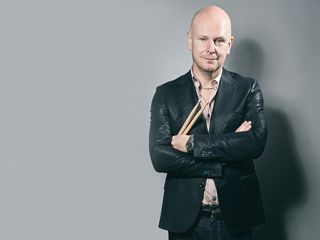
Providing the beats behind Radiohead, Phil Selway has enjoyed a level of acclaim few bands ever dream of. Emerging as the brightest and most daring of the alternative rock bands of '90s Britain, Radiohead pushed musical boundaries even as they shook up the music industry with the pay-what-you-want release of In Rainbows.
"I think that was something we did at the time because we felt it was an exciting way to release a record," says Phil looking back.
"We were accused of devaluing music but we were putting the question back on the people who wanted to listen - what value do you place on it?" Phil Selway
"People were saying, 'Is this the business model for music now?' We'd never intended that. It was just a bit of fun. We were accused of devaluing music but we were putting the question back on the people who wanted to listen - what value do you place on it?"
As someone used to filling stadiums with epic rock songs, Phil aimed for the opposite end of the musical spectrum for his solo debut, Familial. It's an intensely personal album of quiet introspection, full of haunting melodies.
Rhythm met up with the multi-talented Mr Selway last winter at Zildjian's UK headquarters just as Radiohead were working on newest album The King Of Limbs, which was still totally hush-hush.
Why did you decide to make your own album?
"When I first started drumming, when I was 14 or 15, I started writing songs. I wrote for a couple of years but when we started Radiohead it became very apparent quite quickly that I just wanted to concentrate on the drumming.
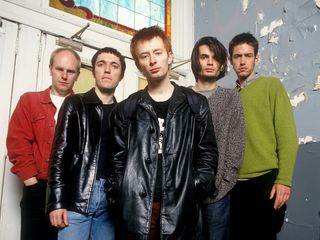
Radiohead circa 1996 © Dennis Kleiman/Retna Ltd./Corbis
Get the MusicRadar Newsletter
Want all the hottest music and gear news, reviews, deals, features and more, direct to your inbox? Sign up here.
"In Thom [Yorke] you've got somebody who is a very prolific songwriter and that seemed to be the material that really suited what we were doing as the five of us. Songwriting went on a backburner for me for a good 15 years. Seven or eight years ago musical ideas started coming through and they gathered momentum and got to this critical mass about three or four years ago.
"I thought, 'I've actually got a collection of songs here.' They weren't finished, the lyrical content was scant and I didn't know if I could sing at that point. They felt like they had a very distinct character and very much my personality in them so it didn't feel like appropriate material for Radiohead.
"I suppose at that point I made the decision to make a record. I was approaching 40 as well, so you're going through the list of things you haven't done yet. That was quite high on there, actually. So it seemed quite a natural thing.
"Though I've been with Radiohead for a couple of decades and a big part of that songwriting/arranging process, actually being at that point where you're the voice at the centre of it, there was a lot to learn. I felt like a late starter, having to learn certain things from the ground up but it was very exciting."
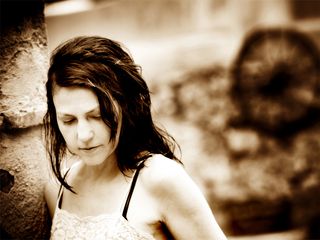
One of Phil's collaborators Lisa Germano © Dina Douglass
Did you feel any weight of expectation, given Radiohead's success?
"Absolutely, and fortunately I was able to work very much under the radar. Even though there were big steps to take, like trying to find a singing voice, I was able to do them out of the spotlight.
"I don't think many people knew I was working on my own record for quite a while so that was good. Just knowing that if I was going to release something, it couldn't be half-baked, it had to be something that I felt was as good as I could make it and had to have a certain amount of quality control running through it.
"At the same time I think to get to that point I had certain things at my disposal, like a studio to work in. There were the musicians that working on the 7 Worlds Collide project in 2008 introduced me to as well. Not many people are lucky enough to work with musicians like Lisa Germano (pictured above), Sebastian Steinberg and Glenn [Kotche] and Pat [Sansone] from Wilco.
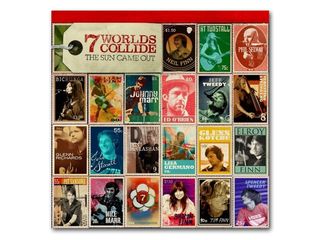
"I knew because of the Radiohead history that it had to be good; I had to feel it was good before I could release it, but to get there I also had certain advantages to help me along the way."
Were you surprised by what you came up with? It's not a drum album, it's a collection of songs.
"It's very much the way the songs came out. When I was writing them I was in this very bizarre position for me where I just couldn't hear drum parts. That's not generally a problem in Radiohead. It comes quite quickly there, but apart from one song I had drums on, A Simple Life, I just didn't really hear drum parts.
"When I was writing [Familial] I was in this very bizarre position for me where I just couldn't hear drum parts. That's not generally a problem in Radiohead. It comes quite quickly there..."
"I suppose because of the way I wanted to approach the record, it is quite delicate, quite hushed in its way. I just wasn't finding a way into that percussively or from a kit point of view. Initially I thought maybe it just won't have drums on at all, then through 7 Worlds Collide I met Glenn Kotche.
"Just seeing how Glenn approached putting drum parts together on Ties That Bind Us, which I wrote as part of the project, was an absolute revelation. With drumming it's very difficult to get that delicacy without sounding too tasteful or too standard, and Glenn is anything but those things.
"He's the most amazing kit player, a highly trained percussionist and percussion ensemble composer, so he brings all of those elements into it. He's got such an original take on how to doctor kits and percussion and putting drum parts together. I saw from that there was scope for that element in the music. I sat there watching Glenn, thinking, 'I wish I could do that.' He's amazing, a stunning drummer."
What sort of kit-doctoring was he doing?
"You'll see him sat there playing a kit with a tube coming out of his mouth. What's going on here? He's blowing into the shells so the heads are rising up as he's playing. I'd never have thought to do that."
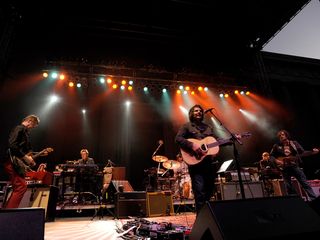
Wilco's Glenn Kotche is "a stunning drummer" according to Phil © Tim Mosenfelder/Corbis
Where did you track the album?
"The bulk of it was done at Radiohead's studio just outside Oxford. That was last September when Lisa, Sebastian, Glenn and Pat all came over for a fortnight, so we made our way through the bulk of the material then. Some of the material was recorded at our management's studio, a place called Courtyard. That's where I really worked on finding a singing voice with Ian Davenport who produced the record.
"About a year before doing the record we got together quite regularly, just trying different approaches until something finally stuck, which was Beyond Reason. That was the first vocal I listened back to and thought, 'That sounds almost convincing.' Some of the tracking was done there. Ties That Bind Us was recorded at Neil Finn's Auckland studio when I was doing 7 Worlds Collide.
Listen: Phil Selway - The Ties That Bind Us
"There is a record which grew out of that project called The Sun Came Out. That whole project was put together to get lots of songwriters and musicians together to write and record an album in two and a half weeks and then to do some shows at the end of it.
"Being in Radiohead for 20 years, even though you're not playing all the other instruments you get a very good insight into how everything slots together, but it's not until you actually do it for yourself that you really get inside it."
"I found a little niche there and was able to bring a couple of songs to that project and that's the one I wrote whilst I was there and it set up the group of musicians who played on the record."
Has making this record given you a different perspective on how you approach the drums?
"Anything that broadens your musicality always moves the way you write drum or guitar parts. Being in Radiohead for 20 years, even though you're not playing all the other instruments you get a very good insight into how everything slots together, but it's not until you actually do it for yourself that you really get inside it.
"That hopefully will have a positive effect on how you respond to that as a drummer."
Were you drawing inspiration from any particular sources in your songwriting? There are shades of Nick Drake.
"I've listened to Nick Drake an awful lot over the years so those things seep in without you realising. I put playlists together when I first started working on the record of people who I felt were in tune with what I wanted to do.
"It was people like Will Oldham and Lisa Germano, and so the nature of the songs and the nature of my singing voice, which was coming out, were all very hushed and I suppose that's what I took from them.
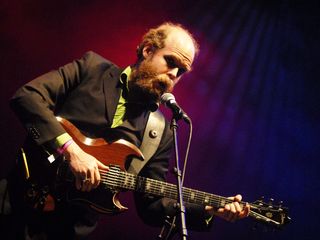
Will Oldham aka Bonnie Prince Billy © Stephanie Methven/Lebrecht Music & Arts/Corbis
"That felt like a very natural place for me to be. That felt more of an extension of my speaking voice, rather than trying to put on your rock hat or your operatic hat or something like that. It felt like an extension of me so I suppose that's what I took from people vocally."
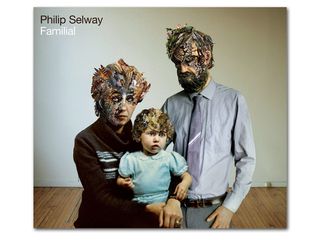
Lyrically, Familial is a very personal album. Are you comfortable putting this out into the world?
"I felt comfortable by the time I got to the end of the record. From a lyrical point of view it took a very long time for me to get there. There are things you feel you don't want to share so you don't put them in. You don't want to have that pay-off where the song suffers because you're taking something out of it if it feels particularly emotive, but at the same time you're conscious of your family, friends, colleagues.
"From a lyrical point of view it took a very long time for me to get there. There are things you feel you don't want to share so you don't put them in."
"It's fine saying stuff about yourself but you're very conscious about drawing from those sources. You don't want to compromise people in any way. That's why it fell more back onto me if there is any sense of that in there. It's stuff that I feel comfortable letting out about myself."
Have you played any of this live yet?
"I first went out with Lisa Germano and we did a couple of weeks of shows in Italy, Spain and Portugal. We did half of Lisa's songs and half of my songs mixed up in the set. It worked really well and then around the release I did some shows in Japan and the UK opening for Wilco and did some of my own shows over on the Continent.
"I had a different band around me for that, with Alex Thomas, another fantastic drummer. It's a five-piece band - I seem to gravitate towards five-piece bands for some reason - and because it's different musicians coming to the same material, it's going to be interpreted in a different way.
"They are coming with very distinct musical voices themselves so it's been interesting how the music can change. In some ways it's changing the music so it has more of a dynamic live. The record is very up-close and personal and I don't know that would necessarily translate well as a whole live show. The rhythmic side of things comes out a bit more live."
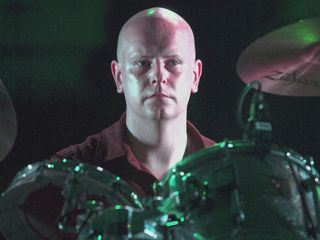
Phil behind the 'safety blanket' of a kit © Patrice Aim/Sygma/Corbis
Do you give much direction to Alex live?
"He doesn't need it, really. He's a very accomplished drummer. Working in bands, everyone makes suggestions about what everyone else does and that's part of that dialogue, or should be.
"I suppose I've been looking for people that I know have got a very distinct approach and part of the fun of it is saying, 'Right, do what you want,' and seeing how everything meshes together from there."
How do you feel stepping out on stage without the kit between you and the audience? Is the kit a safety blanket?
"It is and it isn't. You're playing this instrument which is fine when it's all sitting in nicely, but the moment anything goes slightly wrong, you feel so naked up there because you get this God-awful sound cutting across everybody else. It's not like doing a bum chord and people think, 'Who did that?' It's the drums! But you're right, physically there is this cordon around you."
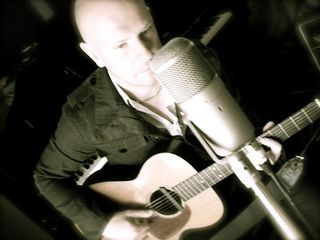
Are you comfortable coming out from that?
"I'm becoming more comfortable with it. The first show that I did with Lisa which was in Turin back at Easter [2010], it just felt so bizarre. You get yourself up onstage, into position and you just do it but you're kind of disconnected from it as well.
"It felt a very uncomfortable place to be. It's been a very steep learning curve this year. It's not so much musically because you're bringing more than the music to the show. It's your personality up on stage. It felt a very vulnerable place to be. There is nowhere to hide. Just as you find your singing voice you find your social voice in between songs.
"I've just had one comment, at Bestival - some charming person shouted, 'Play 'Idioteque', you t**t!' Which I didn't. It's been a lot easier since the album has been out. It's not a Radiohead show."
"The way I look at it is, with the music I was able to do it under the radar and get it to a point I was happy with before I passed it on to people, but with the live stuff there's no other way of learning it other than going out and doing it. You have to learn fast but at the same time it's very raw initially.
"Technical things, like hitting the wrong pedals at the wrong time, tuning, trying to keep your guitar plugged in. They are small things but they are innate to the running of the show. It's learning all of that - the technical side, feeling at ease with that, which I was as the shows went on.
"Just feeling that people are paying money to see you perform and they have a certain expectation, especially with the band that I come from and wanting to meet those expectations. You don't want to send people away unhappy about the evening.
"There is the potential for a lot of things to crowd into your mind as you play, which is the point where you want to be focussed on the playing. It's like learning to drive, there are so many things - mirror, signal, manoeuvre - and until those things are second nature to you then you can't concentrate on finding your ease as a front person.
"I really felt that the shows we were doing towards the end of the run of dates, it was all coming together. Alex Thomas took photos as we went around and looking at the earlier photos, I look quite awkward. By the end, I'm looking at the photos and thinking, I look the real deal there. It's been fascinating from that point of view, learning about stagecraft. It's certainly stretched me."
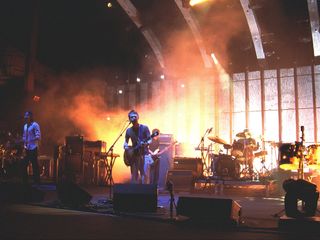
Radiohead live in 2006 © Scott D. Smith /Retna Ltd./Corbis
Do people come to the shows and demand to hear Karma Police?
"I've just had one comment, at Bestival - some charming person shouted, 'Play 'Idioteque', you t**t!' Which I didn't. It's been a lot easier since the album has been out. It's not a Radiohead show."
Have you found you want to beat the daylights out of the drums after not playing them?
"I felt quite nervous coming back to the drums, actually because it was a completely different mindset doing my own material. It's like it's drawing on two different parts of my brain. It makes you re-think the way you do stuff.
"There's so much I want to learn now. I've done a tutorial book recently: all those things I haven't been close to. George Lawrence Stone and stuff like that. I thought, I'm going to go out and get that, just expanding my groove vocabulary so I've come back to it with a renewed vigour.
"I've done my record now which has cleared some space in my head and allowed me to come back with full focus."
Liked this? Now read: Drum kits of the pros: stars' live and studio drum setups in pictures

“Seeking a well-mannered, affable individual. Flashy chops are wonderful, but groove and the ability to listen, react, and contribute to the musical conversation is a must”: Primus put the call out for potential new drummer

“The human manifestation of the word ‘hip’... Always in the moment, always in this time, eternal and classic and at the same time totally nonchalant about it”: Jazz legend Roy Haynes dies aged 99

“Seeking a well-mannered, affable individual. Flashy chops are wonderful, but groove and the ability to listen, react, and contribute to the musical conversation is a must”: Primus put the call out for potential new drummer

“The human manifestation of the word ‘hip’... Always in the moment, always in this time, eternal and classic and at the same time totally nonchalant about it”: Jazz legend Roy Haynes dies aged 99
Most Popular







